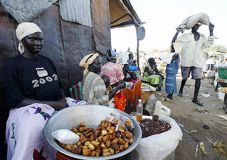Sudan is a ‘biggest’ challenge for UN
JUBA, Sudan, Aug 11 (AFP) — The effort to restore peace and stability in war-shattered, underdeveloped southern Sudan is the biggest-ever logistical challenge faced by a UN peacekeeping mission, United Nations officials here say.

|
|
A southern Sudanese woman sells baked bread in the town of Juba. (AFP). |
Quite apart from the political difficulties posed by the sudden death last month of southern former rebel leader John Garang, the expected force of 10,000 troops must cope with a critical lack of even the most basic infrastructure, buried landmines and shortages of food and water.
“I think the mission is the biggest challenge the UN has ever faced, logistically,” said Major Kim Reisz, the spokesman for the Joint Monitoring Co-ordination Office, the military component of the UN Mission to Sudan (UNMIS).
To carry out its mandate to oversee implementation of the landmark January peace deal that ended Sudan’s 21-year north-south civil war, the UN will assemble some 80 aircraft to haul troops and supplies throughout the deeply impoverished region.
“It is the biggest fleet ever,” Reisz said, referring to the collection of fixed-wing military planes and helicopters that will descend on dirt airstrips scattered around vast southern Sudan, joining dozens of others from relief groups.
Few previous UN peacekeeping exercises have faced anything even close to the situation in southern Sudan, where multi-national troops are to be deployed in six sectors around the region, officials said.
The war, which claimed more than 1.5 million lives and displaced at least four million people, has left the largely barren area the size of Kenya, Uganda, Rwanda and Burundi combined even more desolate and in need of extreme infusions of aid if the deal is to survive.
“There is nothing in southern Sudan that is really in place in order to facilitate the process of implementation with the exception of the agreement itself and the political will of the parties to implement it,” a civilian UN expert said.
“Objectively speaking, everything in southern Sudan is against this agreement: physical infrastructure is either non-existent or was ruined during the conflict,” he told AFP.
“The climatic conditions, the food security situation, the water situation, all are extremely tense and vulnerable, posing very serious challenges,” said another UN expert.
A senior official with Garang’s Sudan People’s Liberation Movement (SPLM) agreed
“It’s not reconstruction, it is construction, we need lots of resources, experience and technology,” said SPLM vice chairman James Wani Igga.
“It requires a lot of sacrifices and a lot of suffering in the initial stages,” he said. “You really have to sweat before you harvest.”
The mission must also muster enough troops as it is currently well below its anticipated strength with fewer than 2,000 currently deployed.
Bangladesh, China, Egypt, India, Italy, Kenya, Nepal and Zambia are all slated to provide troops but there have been numerous deployment delays, many related to poor or non-existent facilities and transportation problems, officials said.
“There have been transport problems and other hurdles during the deployment in this rainy season,” Reisz added. “Countries have been unable to meet their obligations, they have been faced by problems that have caused the delay.”
The transport situation is further complicated by thousands of landmines which still litter former battlefields and roads to key towns and villages, many of which are currently undrivable.
